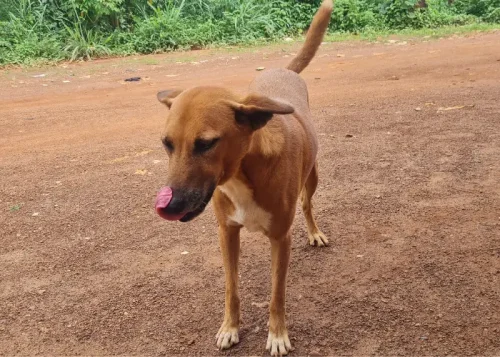🐾 The Toyota of Dogs: Africa’s Most Loyal Breed — The Ekuke
If Africa ever gave out a “Lifetime Achievement Award” for resilience, loyalty, and street smarts, the winner wouldn’t be a lion or an elephant. It would be that short-haired, sharp-eyed, dust-colored dog you’ve seen guarding compounds, chasing intruders, or escorting schoolchildren home. Its name? The African Ekuke — also fondly called Bingo in Nigeria, Mbwa Kali in Kenya, Asong in Cameroon, and simply “the local dog” everywhere else.
To put it bluntly: the Ekuke is the Toyota Corolla of dogs.
Affordable, durable, low-maintenance, and will still run even when others have long broken down.
A Breed Without Pedigree — Yet Full of Pride
The Ekuke is not recognized by the American Kennel Club, and you won’t find it on fancy breeder lists. It has no registration papers, no family tree, and no designer tag. But step into any African neighborhood and you’ll understand why this dog has earned its legendary status.
From the dusty streets of Lagos to the farms of Accra, from Kampala’s suburbs to rural villages in the Congo, the Ekuke reigns supreme. It’s the people’s dog — born in the compound, raised by experience, and trained by life itself.



Half Caste German Shepherd


Built for Africa
While imported breeds like German Shepherds and Rottweilers often fall sick in the tropical heat, the Ekuke thrives. Its immune system is a fortress built through generations of survival.
Resilience is in its DNA.
It drinks from puddles, eats leftover fufu or pap without fuss, and still has the energy to chase down a stray goat. Its short fur keeps it cool, and its lean body is built for speed. No fancy dog food? No problem. Give it eba, rice, or bones from last night’s soup, and it’ll wag its tail in gratitude.
Veterinarians often remark that the local dog rarely falls ill from diseases that wipe out imported breeds. It’s nature’s way of saying: “Adapt or be forgotten.” And the Ekuke adapted better than anyone.
The Ultimate Security Dog
Every Nigerian knows this truth: an Ekuke’s bark is a warning and a weapon.
You don’t need CCTV when Bingo is on duty. He can smell trouble from a mile away and will announce it with a bark so loud, it sends chills down the spine of intruders. Ask any night guard — even the bravest of robbers hesitate when they hear that deep, echoing growl of a local dog ready to defend its home.
The Ekuke doesn’t need obedience training. It learns by watching. It knows the family members, the regular visitors, and the suspicious strangers. It will walk you to the gate at night and chase away anyone who lingers too long.
There are countless stories of Ekuke dogs saving families from robbers, fire, or even snake attacks — and disappearing into the night before anyone can say “thank you.”
The Wanderer Who Always Comes Home
One of the most fascinating things about the Ekuke is its independent spirit.
It can roam all day, visit friends (both dog and human), explore the neighborhood — but when night falls, it always finds its way home. Rain or shine, it knows exactly which gate belongs to its family.
It’s the African equivalent of a teenager who insists on freedom but never forgets where dinner is served.
The Love Nobody Brags About
In many African homes, the Ekuke isn’t pampered. It doesn’t have a bed or a name tag, but it has something better — belonging. It’s part of the compound, the first to greet guests, the one that runs behind the children on their way to school.
When you come home late, it’s waiting. When you’re in danger, it’s alert. And when you leave for weeks, it remembers your scent the moment you return.
For a dog that asks so little, it gives so much.
The Ekuke vs Imported Breeds
| Trait | Ekuke (African Mongrel) | Imported Breed (e.g. German Shepherd) |
|---|---|---|
| Cost | Practically free | ₦500,000+ or more |
| Feeding | Eats leftovers happily | Requires premium food |
| Health | Naturally resistant | Prone to heat & tropical illness |
| Loyalty | Fierce and instinctive | Trained loyalty |
| Maintenance | Minimal | High (vet, grooming, etc.) |
| Security Skills | Natural guard instinct | Requires formal training |
If you ever doubted which dog truly represents the African spirit — look no further.
The Future of Africa’s Own Breed
There’s a growing movement among veterinarians and animal lovers to formally recognize the African Local Dog as a distinct breed. Some call it the Africanis in Southern Africa — a term already recognized by certain kennel clubs in South Africa. Experts argue that this dog deserves conservation and breeding programs, not neglect.
After all, the Ekuke has served Africa for centuries — as protector, friend, hunter, and companion. It deserves its place in history books and in hearts.
Final Bark: Respect the Ekuke
Forget the glossy Instagram dogs in winter jackets. The real legend lives under the African sun, guards your gate at night, and still wags its tail when you walk in.
The Ekuke may not win dog shows, but it wins where it counts: loyalty, survival, and love.
It’s the Toyota of dogs — not flashy, but it will never leave you stranded.
So next time you hear that deep, confident bark from across the street, pause for a second.
That’s not just noise. That’s the sound of Africa — alert, alive, and loyal.
-
“A proud Ekuke standing alert at dusk — Nigeria’s local guard dog.”
-
“Street-wise and sharp-eyed: the Ekuke dog patrols the compound.”
-
“When intruders approach, the Ekuke’s bark serves as a neighborhood alarm.”
-
“Young Ekuke puppy ready to grow up guard-duty strong.”
-
“Urban Nigerian local dog in action — watching, waiting, guarding.
